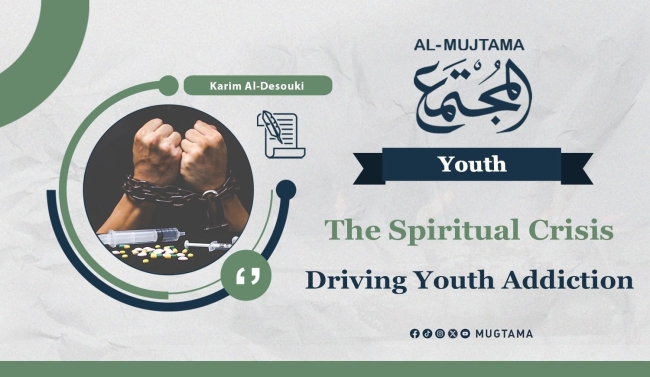More than 210 million people worldwide are affected by addiction annually, according to the World Health Organization. The organization's statistics also reveal that 15.3 million people suffer from diseases due to drug abuse, and nearly 200,000 of them die each year.
However, the United Nations Office on Drugs and Crime (UNODC) presents alarming figures showing that around 275 million people used drugs at least once globally in 2016, with 450,000 people dying as a result. The International Narcotics Control Board (INCB) indicates that the percentage of drug addicts in the Arab world ranges between 7-10%, with most addicts being young people.
For example, the number of drug users in Egypt has risen to about 10% of the population, in Sudan, there are 6 million addicts, in Algeria over 300,000, a similar rate in Tunisia, while in Saudi Arabia there are 200,000, in Kuwait over 40,000, in Lebanon 24,000, and in Oman 5,000 addicts, according to statistics from international, governmental, and non-governmental organizations.
The true crisis lies in the lack of accurate statistics on the number of addicts in the Arab world, as the announced figures are based on the number of people arrested for drug use, which does not reflect the real number; because the families of addicts remain socially embarrassed to report their children, which means the numbers and estimates are likely more.
Interestingly, the American Institute “NIDA” recorded that about 70% of addicts started using drugs in their teenage years, which means we are facing a bigger problem that goes beyond the boundaries and causes of the disease; the roots of this problem run deep in the soil of spiritual emptiness that our youth suffer from. How can we blame a young person who has not tasted the sweetness of faith and has not felt the pleasure of closeness to Allah for seeking refuge in the dark world of drugs, even if it is illusory?
The real reason behind the psychological distress that drives many to the abyss of addiction is the distance from the path of Allah, while some who claim modernity and progress promote the idea that drug use is a form of personal freedom, and some even call for its legal allowance, as some European countries do.
Here, we ask: What kind of freedom makes a person a prisoner to a chemical substance that takes away his mind and will? When were the laws of Europe and America the reference for the Islamic Ummah?! Islam, with its divine methodology, forbade everything that affects the mind, considering that preserving it is one of the five objectives of Sharia; hence the Prophet ﷺ said, “Every intoxicant is prohibited.” (Narrated by Muslim)
Moreover, how many movies or TV series depict drug use as a sign of sophistication and civilization! How many electronic platforms have facilitated the connection between dealers and victims! Therefore, as Muslim societies, we must stand united against this cultural invasion that targets our values and morals.
The harsh social and economic realities in many Arab and Islamic countries provide fertile ground for some youth to escape their reality through drug use or in search of quick solutions to their psychological and social problems, which cannot be treated merely by providing material treatment programs that address the symptoms and ignore the root cause.
We cannot effectively combat addiction among our youth without addressing the psychological and social sources that drive them to escape to drugs and intoxicants, which is linked to improving these youths' lives in all their relationship networks, especially their relationship with their God, which is the only way to face life's pressures and difficulties instead of escaping them.
This meaning is pointed out in the Quran when describing the prayer, which is not just physical movements but a connection of the soul with its Creator, giving the believer tranquility and peace; “Those who have believed and whose hearts are assured by the remembrance of Allah. Unquestionably, by the remembrance of Allah hearts are assured.” (Ar-Ra'd: 28) If we taught our youth their acts of worship with this understanding, none of them would find spiritual emptiness.
Addiction has unfortunately turned into a plague in many Islamic countries, and there is no way to escape it merely by enacting strict laws, important as they are. The solution lies in rebuilding the youth from within, reconciling them with the values of their religion, and opening new horizons for them for work, creativity, and marriage.
Where is the role of the Muslim family in protecting their children? Where is that faith-based upbringing that instills in our children the religious and moral deterrent? The Prophet ﷺ warned us against neglecting this great duty by saying: “All of you are guardians and are responsible for your wards.” (Agreed upon)
A comprehensive approach in dealing with addiction cases, combining medical and psychological treatment on one hand, and spiritual and moral rehabilitation on the other, is the way to rescue the body of our nation from this cancer. An addict is not just a body needing treatment, but a human being with a soul that needs the nourishment of faith and the warmth of mercy.
Let us start a campaign to combat the cancer of addiction based on this principle, for the path to happiness in both worlds does not pass through the illusions of drugs, but through faith in Allah and righteous deeds, and feeling the sweetness of closeness to the Creator of the soul.
-------------------------------------------------------------


